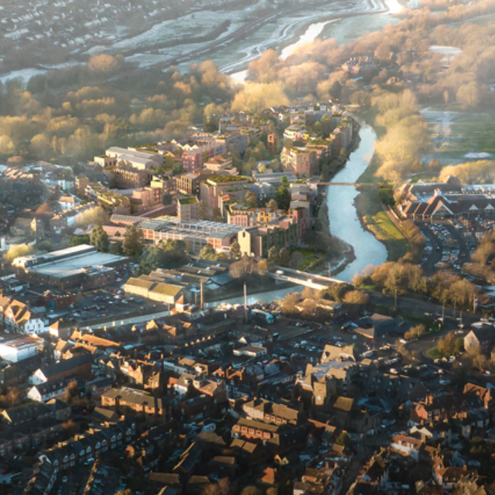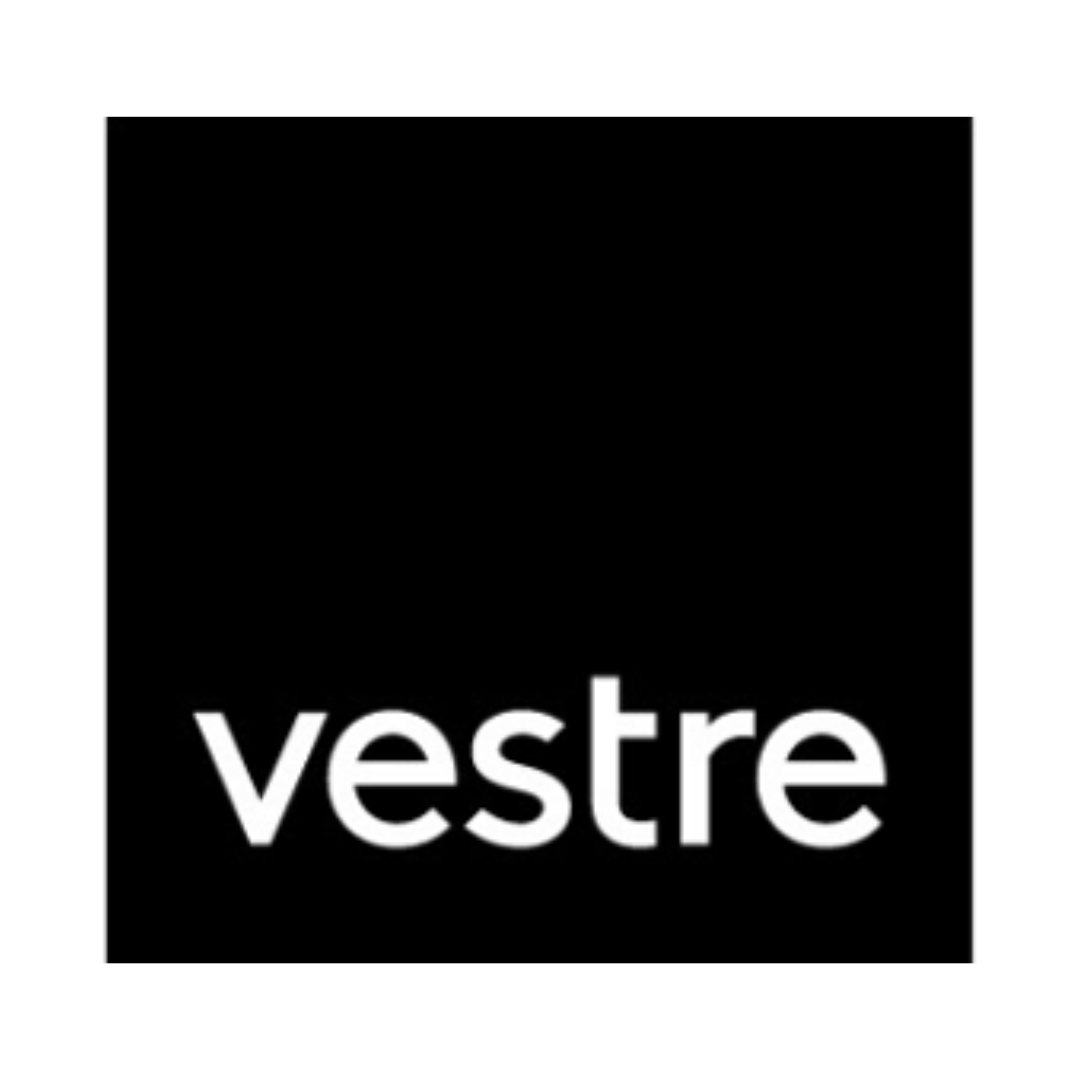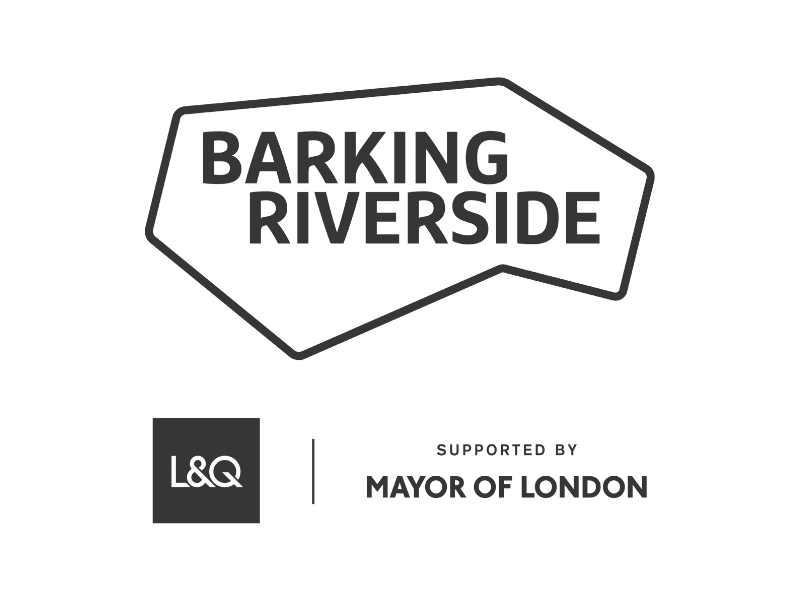Project showcase
The Phoenix, Lewes – Human Nature Places with Adam Richards Architects, Al-Jawad Pike, Archio, Ash Sakula, Charles Holland, Human Nature, Material Cultures, Mae, Mole, Rabble, TDO, Periscope

Situated in the heart of Lewes, the Phoenix is a 7.9-hectare brownfield site that runs along the river Ouse. The neighbourhood will comprise of 700 new homes that will be constructed primarily in sustainable timber, some of which will come from Sussex woodlands, and provide the town with much-needed homes and jobs, community spaces, a river walk, flood defences and a health centre.
Who is on the project team?
Architects: Adam Richards Architects, Al-Jawad Pike, Archio, Ash Sakula, Charles Holland, Human Nature, Material Cultures, Mae, Mole, Rabble, TDO
Engineering: Atelier Ten, services and environmental; Eurban, timber; Expedition, civil & flood; Whitby Wood, structural and executive
Landscape: Ecology Solutions, Periscope, Terra Firma
Other: CBRE, valuation; RUA, quantity surveyor and contracts, A-squared, ground investigations; Greencore; TJC, heritage, Urban Movement, WSP, Architecture Ensemble, BakerBrown, Oliver Lowenstein, TDO.
Describe the context of this project and its neighbourhood and people?
Situated in the heart of Lewes, the Phoenix is a 7.9-hectare brownfield site that runs along the river Ouse and is crying out to be revived. Combining this neglected site with the imperatives of the climate emergency, the Phoenix will be a new, regenerative neighbourhood, powered by renewable energy and designed to encourage a culture of sharing. The neighbourhood will comprise of 700 new homes that will be constructed primarily in sustainable timber, some of which will come from Sussex woodlands. Led, funded and built by local people, the Phoenix is naturally and necessarily of its place. It seeks to capture the radical spirit of Lewes and enhance its extraordinary landscape. These plans and the wider development process associated with them, creates multiple opportunities to bind underprivileged communities, chart pathways out of disadvantage for young people and house a wide community of families well, while improving the quality of life for all who live, work and play here.
The Phoenix will embrace its position at the edge of the Ouse, opening up the riverfront to Lewes. A Belvedere and boardwalk will run the length of the Phoenix, connecting to Willey’s Bridge in the north and the Causeway Foreshore Park to the south. It will widen in the centre, where elevated gardens will provide a place to sit and take in views of the river and Downs.
Please describe your approach to this future place and its mix of uses. How will it function as a vibrant place? How does it knit into, and serve the needs of, the wider area?
The development will transform a neglected brownfield site into a beautiful, green place, providing the town with much-needed homes and jobs, community spaces, a river walk, flood defences and health centre. At the heart of the neighbourhood will be a series of public squares connecting to a community canteen, event hall, taproom, fitness centre, workspace and makers’ studios, much of which will be housed within repurposed industrial structures. Shared courtyards, parks, green corridors and rooftop gardens will enable social interaction, promote communal living and provide habitats for local wildlife.
The Phoenix will promote the practice of shared living: of space, resources, amenities and ideas. The neighbourhood will provide community centres and outdoor space – including courtyards, play areas, gardens and green roofs – that encourage interaction between people of all ages. The culture of sharing will extend to a library of things (where tools and utensils can be borrowed), electric car club and hire service. The homes in the neighbourhood are mostly apartments, from compact studios to larger family flats with shared green space favoured over private gardens.
We are converting an old soap factory into a family-friendly sports and wellness centre, including music studios, a juice bar, fitness rooms, an indoor skatepark and bouldering centre. It will particularly appeal to the interests of children, teenagers and young adults – groups not always well catered for in Lewes.
What is the environmental impact of the project? How will the carbon use and material impact of the development be mitigated? What is the sustainability strategy?
The Phoenix will run off a neighbourhood-wide energy system and grid fuelled by PVs, off-site renewable energy and ground and water heat pumps. The development is low-traffic, due to the addition of a Mobility Hub that will provide residents with electric cars for hire, a car club and car share, easing the demand for personal vehicles.
Structural timber will be our primary building material and will be used on almost all new buildings on site. As timber, sourced from sustainable, well-managed forests is regenerative with its ability to sequester carbon, this will give the buildings an overall negative carbon impact.
We also intend to reuse materials that have already been created and therefore retain and capture their embodied carbon. In addition to the retention of three industrial heritage structures and our office, Phoenix House, we are conducting an audit to reveal what site materials can be reused in building structures, such as steel trusses and cladding, brick walls and buttressing, and what can be recycled for ‘cut and fill’ (to level and landscape the site) or reconstituted as bricks.
Our intention is to create a place that inspires and enables all to live well within the planet’s means, providing excellent recycling, waste management and composting facilities onsite. Food waste will be composted, providing fertilisation for urban farming, where food is grown for the neighbourhood canteen, cafés and restaurant. We are also providing spaces for residents to set up their own ventures focused on upcycling, repair and reuse.
Describe the social impact of the project: How will this future place contribute to the economic, environmental and social wellbeing of its citizens?
The Phoenix will be a “five-minute neighbourhood” where daily needs can be met by a short walk. This negates the need for most personal cars and the Mobility Hub, with its electric car provision, channels vehicles to the southern tip of the neighbourhood, creating streets safe for all.
We aspire to provide opportunities for everyone: providing workspaces that support start-ups with a wide range of activities, including small-scale manufacturing, tech, service industries and makers. It also means providing education opportunities, especially for those who struggle to engage with the school system. We are hosting East Sussex College, providing facilities for their training courses in the construction industry and hope that many of the 500 construction jobs that we will be creating can be filled by young people from Lewes.
The Phoenix comprises 18 different housing blocks designed by 13 different architects which gives the neighbourhood diversity, character and housing choice. The new homes will meet the needs of people of all ages and incomes, our target is that 30% of the new homes will be provided at lower than market price, with a significant number of Lewes Low-Cost Housing.
The neighbourhood will boost the local economy significantly- this includes £15m invested in new flood defences and river walk; an uplift of £26m for the local economy each year; and 381 permanent jobs. Human Nature will pay £7m as part of the Community Infrastructure Levy, designed to help local authorities raise funds for supporting infrastructure, facilities and services.
Festival of Pineapples
24-26 February 2026
Pineapples prize giving night
April
Pineapples at Festival of Place
10 June 2026
© The Pineapples - Tweak Ltd. 124 City Road, London, EC1V 2NX. Tel: 020 3326 7238





